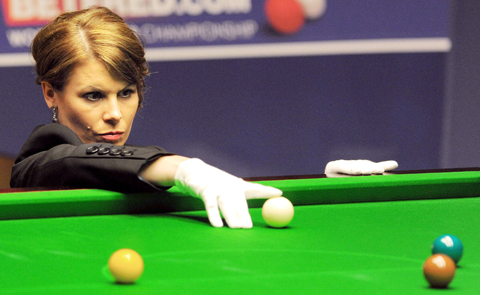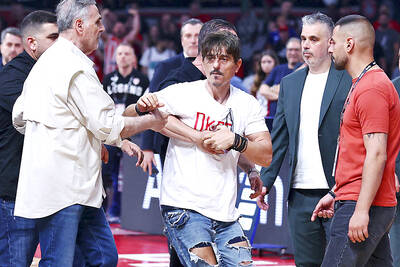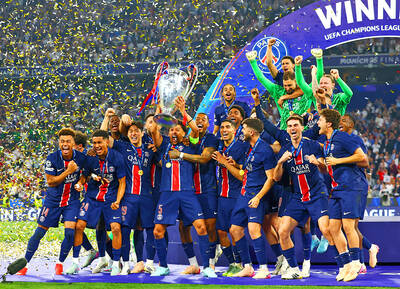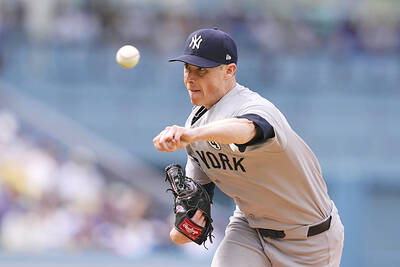The hush that enveloped John Higgins’ comeback was momentarily broken as he paced around the table. The loaded silence, sprinkled with self-conscious coughing, suddenly gave way to a buzz of discussion. Every neck inside the packed Crucible Theatre craned to one corner of the room.
Halfway through the tension-racked deciding frame of a match at the World Snooker Championship last Sunday — with Higgins facing a tricky shot — a spectator had fainted. Not two hours earlier, another fan had done the same.
The incidents were probably no more than quirks of circumstance. But to the cynics and reformers in the snooker world, they were perfect fodder. Endless matches with players dressed like waiters in a library-quiet setting? No wonder fans are slipping from consciousness.

PHOTO: AFP
“I just think that snooker’s always been there,” Higgins said. “It’s never had to regenerate itself; it’s always stuck to the same tournaments, the same formats year after year after year. I think people are just getting bored with it.”
Higgins collected his third World Snooker Championship and a check for £250,000 (US$376,700) on Monday, when he defeated Shaun Murphy 18-9 in the final. Higgins also won in 1998 and in 2007; Murphy was the 2005 champion.
Like darts, snooker has been a popular sport on British television since the 1970s, even as a majority of viewers were still trying to make out the different-colored balls on black-and-white TV sets. Television ratings remain strong, and so is interest from the BBC. It still devotes more than 100 hours of coverage during the 17 days of the world championship, but the game is suffering from an image problem.
The three-time world champion Ronnie O’Sullivan has even said that snooker is dying. And when O’Sullivan makes a claim like that, the sport’s governing body listens. Sir Rodney Walker, who has been the chairman of the World Professional Billiards and Snooker Association since 2004, could not help agreeing that something needs to be done.
“Like all businesses, we have to look to the future,” Walker said. “I don’t believe that presenting the same product year after year is going to be sufficient, so we have to look for more imaginative ways to present snooker to the public.”
On the world stage, snooker still falls far behind pool, its simpler cousin. Other than six pockets and a green playing surface, the games bear little resemblance. Snooker uses 21 colored balls, a cue ball and a complex points system on a table that is nearly 3.7m long and almost 2m wide. The pockets are narrower than those on a pool table, the surface is quicker, the balls are smaller and the cues are thinner.
“It’s 100 times more difficult than pool,” Higgins said. “You look at some of the guys who didn’t quite make it to the top in snooker go over and become some of the best pool players. You couldn’t really replicate that going the other way.”
But precisely how to replicate pool’s popularity is a major sticking point for snooker.
Players like O’Sullivan and Higgins have suggested doing away with the stuffy conventions of bow ties, waistcoats and matches played over the course of four sessions on two days — much the way cricket did by inventing the shorter, more casual Twenty20 format. The older generation, however, says that few areas can be changed without changing the spirit of the game.
But Walker is counting on a quicker brand of the game known as Super6, with fewer balls and shorter matches, to make it more appealing worldwide.
Snooker is already reaping the benefits in China. A first-round match between Ding Junhui and Liang Wenbo during the world championship drew an estimated 100 million television viewers in China, according to Walker.
Critics say that the next wave of sponsorship will not come unless snooker rediscovers some of the characters who made it so popular, like the fiery Irishman Alex Higgins, known as “Hurricane,” and Jimmy White, nicknamed “Whirlwind.” Even the quiet Steve Davis, who won six world titles in the 1980s, earned the nickname “Interesting.”
Alex Higgins and White played in beer-soaked men’s clubs and exhibitions to earn a living playing snooker. But the next crop of players found there was enough money to be won in tournaments.
Stephen Hendry was in that group. He broke through in the early 1990s, on his way to becoming one of the top players in history. Last week, he won £147,000 when he achieved a perfect score, a maximum 147-point break, in one frame of his quarter-final match against Murphy. The feat requires potting a specific sequence of 36 consecutive balls. A subdued fist-pump was all Hendry did to celebrate his ninth career maximum.
“It’s a brutal sport because you don’t have to do much wrong to lose,” John Higgins said. “Baseball, tennis, golf, you can hit back and rectify things right away. In snooker, if you play a bad shot, you could be sitting in your chair for an hour.”
Getting television audiences to do the same is proving far more difficult.

The Greek basketball league finals between Panathinaikos and Olympiakos were suspended by the government on Monday following on-court scuffles involving rival security teams. The best-of-five series is at 1-1. The third game, scheduled for today, has been postponed. The owners of both clubs were summoned to meet with the country’s sports minister. They “will be asked to provide explicit guarantees that this situation will be brought to an end. If not, this year’s championship will be definitively canceled,” government spokesman Pavlos Marinakis said. “There can be no tolerance for such pathological phenomena of violence and delinquency.” In online posts, the owners of Panathinaikos and

‘DREAM’: The 5-0 victory was PSG’s first Champions League title, and the biggest final win by any team in the 70-year history of the top-flight European competition Paris Saint-Germain won the Champions League for the first time as Luis Enrique’s brilliant young side outclassed Inter on Saturday in the most one-sided final ever with teenager Desire Doue scoring twice in an astonishing 5-0 victory. Doue supplied the pass for Achraf Hakimi to give PSG an early lead and the 19-year-old went from provider to finisher as his deflected shot doubled the advantage in the 20th minute. Doue scored again just after the hour mark, ending any doubt about the outcome before Khvicha Kvaratskhelia ran away to get the fourth and substitute Senny Mayulu, another teenager, made it five. Inter were

Ryan Yarbrough picked up a dazzling World Series ring from his time with the Los Angeles Dodgers last season. Then he went out and beat them. The New York Yankees starter on Sunday pitched one-run ball over six innings, struck out a season-high five and blanked the Dodgers’ top four hitters in a 7-3 win. “I feel like I’m in a really good place right now and really trying to continue that,” Yarbrough said. “I’m having a lot of fun.” The 33-year-old left-hander made 44 relief appearances between the Dodgers and Blue Jays last season. The Dodgers designated him for assignment on July

The Crusaders yesterday produced a clinical performance in difficult conditions to beat the Queensland Reds 32-12 and claim home advantage in next week’s Super Rugby semi-finals. Lock Scott Barrett and prop Tamaiti Williams scored first-half tries to reward an outstanding performance from the Crusaders’ forwards in wet, slippery conditions and bitterly cold temperatures. Scrumhalf Noah Hotham defied the conditions in the second half to score a superb solo try and, after kicking a conversion and penalty to make the score 22-0 at the hour mark, flyhalf Rivez Reihana scored a try which took the game beyond the Reds. “Typical Christchurch weather, cold, wet